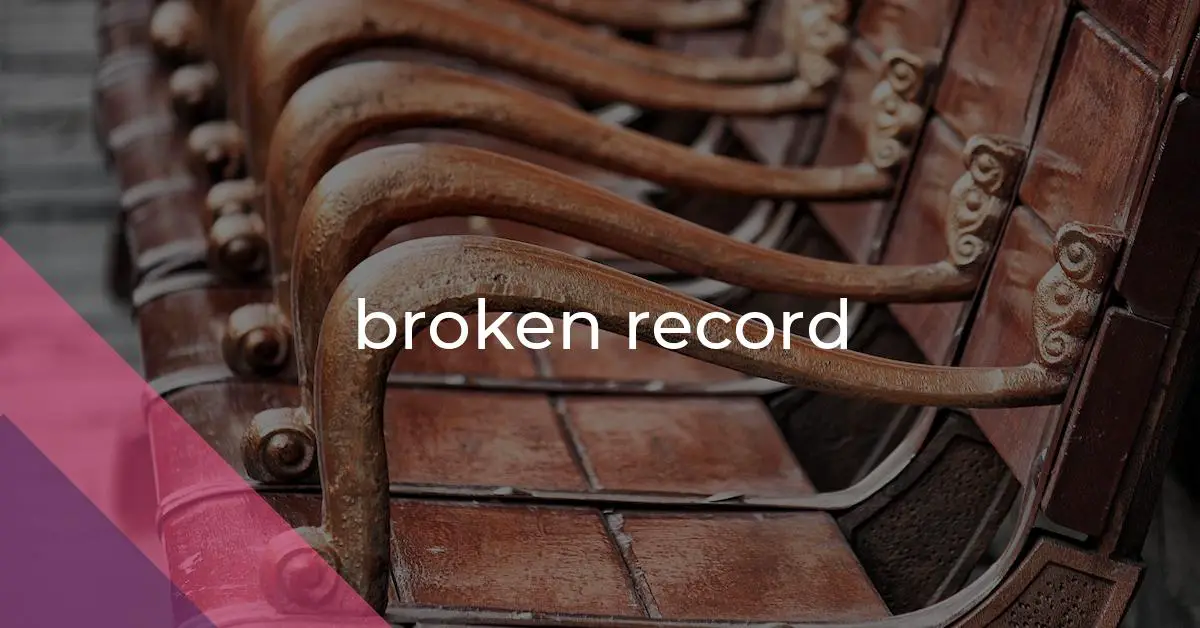broken record: Idiom Meaning and Origin
What does ‘broken record’ mean?
The idiomatic phrase "broken record" is used to describe someone who repeatedly says the same thing over and over again, often to the point of annoyance or frustration.

Idiom Explorer
The idiom "here we go again" is used to express a feeling of frustration or annoyance when a familiar or repetitive situation occurs. It implies a sense of weariness or resignation toward something that has happened before and is likely to repeat.
The idiom "have seen this movie" means to be very familiar with a situation or scenario, often implying that it is repetitive, predictable, or uninteresting.
The idiom "have had it up to here" means being extremely frustrated or fed up with something. It signifies reaching a limit or threshold of tolerance.
The idiom "harp on the same string" means to constantly repeat the same argument or topic without offering anything new or different.
The idiom "harp on one string" means to repeatedly talk about the same topic or issue without considering other perspectives or topics.
The idiom "go round in circles" means to keep doing or discussing the same thing without making any progress or reaching a resolution.
The idiom "give someone grief" means to continuously cause trouble or annoyance to someone, often by criticizing or complaining about their actions or behavior.
An idiom used to express frustration, shock, or annoyance, often in an exasperated or pleading tone.
The idiom *fed up* means feeling extremely annoyed, frustrated, or tired of something or someone. It implies a strong sense of dissatisfaction or exasperation.
The idiom "every time" is used to indicate that something happens consistently or repeatedly. It can also imply that something always occurs in conjunction with a specific action or event.
Repetitive reverberations
The idiom "broken record" is a widely used phrase in American English to describe someone who repeats the same thing over and over again. It draws its metaphorical meaning from the scratched vinyl records that would play the same part of a song on loop. The phrase "broken record" became popular in the 20th century with the rise of vinyl records. Vinyl records were less prone to damage than their tinfoil predecessors but were still susceptible to scratching, leading to the repetition of a particular section of a song.
In the late 19th century, Thomas Edison invented the phonograph, the first device capable of recording and playing back sound. Early phonographs used tinfoil-covered cylindrical drums to record sound. As the recording needle passed over the indented areas on the drum, it produced sound. However, due to the limitations of these early phonographs, the tinfoil would often become worn or damaged after repeated use, resulting in a "broken record" situation. The needle would get stuck in a groove, causing the same part of the recording to play repeatedly.
The idiom "broken record" gained popularity throughout the 20th century, particularly with the rise of vinyl records. Vinyl records were more durable than tinfoil drums, but they were still susceptible to scratching. These scratches would cause a particular section of a song to repeat, reinforcing the association between repeating records and individuals who incessantly repeated themselves.
In contemporary usage, the idiom "broken record" is used to describe individuals who repeat their opinions, complaints, or grievances without considering the opinions or perspectives of others. It suggests a lack of originality, creativity, or adaptability in one's speech or behavior. It can also imply frustration or annoyance on the part of the listener, who may feel trapped in a repetitive conversation. The idiom is often used in informal or casual contexts.
The related idiom "here we go again" can be used to further emphasize the sense of frustration or exasperation in a repetitive situation. It adds a tone of resignation and suggests that the speaker feels they are stuck in a cycle of repeated actions or conversations. When someone is described as a "broken record," it often implies that their repetition has become tiresome and predictable, eliciting the response "here we go again."
The idiom "as ever" can also be related to the concept of a broken record. It is often used to emphasize that someone's behavior or speech is consistent and unchanging. When someone repeatedly acts or speaks in the same way, they can be described as a broken record, and the phrase "as ever" can be used to highlight this trait. It suggests that the individual has not deviated from their usual pattern of behavior or speech, reinforcing the comparison to a scratched record that consistently plays the same part of a song.
While the idiom "broken record" has become a popular metaphor in American English, it is not without its critics. Some argue that labeling someone as a "broken record" may disregard the validity or importance of their message. They contend that dismissing someone as a broken record may prevent meaningful dialogue or understanding. Others believe that using the idiom provides a clear and concise way to describe repetitive behavior or speech, without necessarily dismissing the content of the message.
Regardless of these debates, the idiom "broken record" remains a common and recognizable phrase in American English. It serves as a reminder of the historical significance of recorded sound and its impact on language and communication. When someone is compared to a broken record, it suggests that their repetition has become monotonous and potentially annoying, drawing on the image of the scratched vinyl record that plays the same part of a song over and over again.
Example usage
1. She kept repeating the same complaint over and over again, like a broken record.
2. Every time I bring up the topic of his ex-girlfriend, he starts talking about it like a broken record.
3. The politician's speech was filled with empty promises, making him sound like a broken record.
More "repetition" idioms



